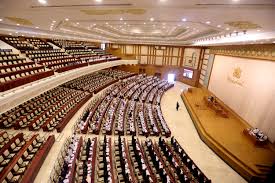An updated banking law of Myanmar has been submitted to the parliament
24 กรกฎาคม 2558
An updated banking law has won the support of the Pyithu Hluttaw Bill Committee and has been submitted to the Pyithu Hluttaw on July 21.
The draft Banks and Financial Institutions Law had been delayed due its complexity, but its proponents say the law will assist with bringing the domestic financial sector in line with international standards.
It will replace the 1990 Financial Institutions of Myanmar Law.
The bill committee’s report said the new law includes what is necessary to allow proper regulatory oversight by the Central Bank, to keep the monetary system strong and to lessen the risk held by bank depositors.
Among other provisions, the draft sets large minimum capital requirements for both foreign bank branches and local banks, as well as strengthening their governance requirements and also covering new technologies in banking.
Central Bank of Myanmar deputy governor Daw Khin Saw Oo said it has been written with assistance from the World Bank, aiming to develop the financial sector to support the state.
Edwin Vanderbruggen, partner at VDB Loi, said the draft law improves the protection of the health of banks through a number of new measures, mostly by restricting related transactions and dividends.
A bank may continue to provide credit to companies which are directly or indirectly owned by its shareholder or chair. But the draft law adds two important conditions which did not exist in the existing law – firstly that the relevant Board approval, which already existed in the Financial Institutions of Myanmar Law, must be granted with a two-thirds majority and not a simple majority, and secondly that all credit must have collateral.
“Although it is clear that the Draft Law indeed improves the protection, the question remains if this is sufficient. For example, the nature and quantity of the collateral is not defined, and in some cases the two-thirds rule may not be enough to assure an overweight of related party loans,” he said.
Mr Vanderbruggen also said that one provision that has rattled banks and finance companies is a rule they must basically apply for a new licence.
“There is thus a theoretical risk that some applicants which would not meet the standards of the new law, would not receive a new licence,” he said.
“In reality I don’t think that there is much to fear, at least not based on the draft law in and of itself. Most standards which could be an issue for existing banks are set through regulation, and are not fixed in the law.”
Banks have already been preparing for the new law. The nine foreign banks coming in must have a minimum of K75 billion in capital, as is required by the draft law. Domestic banks too are working to raise their capital to reach a new minimum of K20 billion.
The bill committee also noted the draft had been written after meetings with 18 local banks, the Central Bank of Myanmar and GIZ, a German organisation.











